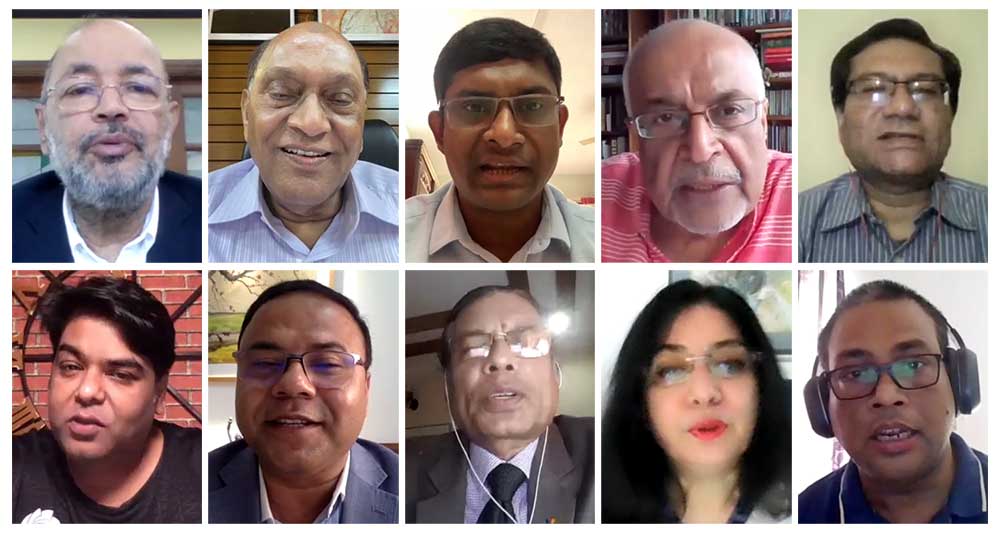The Government of Bangladesh (GoB) had taken several support measures to be delivered by the local authorities (LAs), targeted for the poor and the vulnerable sections of the population, to tackle the situation originating from the COVID-19 pandemic. There is a lack of disaggregated national-level database which is required for effective distribution of these supports. On a positive note, increased use of technology can be observed in delivery of these relief supports in recent times.
These observations emerged at a virtual national dialogue titled “Relief Supports to Cope with COVID-19: How Effective Were They?” held virtually on Thursday, 27 May 2021. The dialogue was organised by the Centre for Policy Dialogue (CPD) and Oxfam in Bangladesh in association with Citizen’s Platform for SDGs, Bangladesh.

While making the keynote presentation, Professor Mustafizur Rahman, Distinguished Fellow, CPD mentioned that higher allocation, both in terms of coverage and the amount of support provided to the affected population, is necessary in any emergency situation such as the ongoing pandemic. Spatial features of impacts ought to inform interventions, both in terms of quantity and type. Higher unemployment, income erosion, switching to new jobs with lower pay and new dimensions of vulnerability such as emergence of ‘new poor’ during COVID type emergencies, should guide both targeting and allocation.
He further stated that, a massive awareness campaign about the relief support hotlines should be launched at the earliest. Service providers must be provided with clear guidelines as regards implementing particular relief programmes and the concerned selection criteria. Transportation costs and additional costs associated with receiving benefits should be taken care of so that it does not create additional burden for low-income marginalised groups. Adequate preparations should be there to avoid delays in delivering transfers/benefits. His presentation further added that there is a lack of a functional grievance redress mechanism for relief related complaints; a whole of society approach is required while implementing these programmes; zero tolerance policy as regards corruption and malpractices in relief delivery is compulsory; and development of a reliable database is crucial for effective implementation.
Dr Md. Enamur Rahman, MP, Honorable State Minister, Ministry of Disaster Management and Relief, Government of Bangladesh was the Chief Guest of the dialogue. He shared with the dialogue participants that relief supports are being distributed and there are no complains of people suffering from hunger. Hon’ble State Minister also stated that more emphasis will be given on making the relief distribution process more transparent.
Speaking as the Special Guest, Mr A B Tajul Islam, MP, Chairman, Parliamentary Standing Committee on Ministry of Disaster Management & Relief commented that both service providers and recipients need to take a moral high ground so that it becomes possible to distribute the relief supports to the most deserving.
The Guest of Honour at the dialogue, Barrister Shameem Haider Patwary, MP, Member, Standing Committee on Ministry of Law, Justice and Parliamentary Affairs recommended that the relief distribution should be based on the poverty scenario of each district.
Mr Anir Chowdhury, Policy Advisor, Access to Information (A2I) Programme and Mr Tanvir A Mishuk, Managing Director, Nagad delivered special comments at the dialogue. Mr Chowdhury highlighted the need for innovative ways to create awareness among the mass people about the relief programmes. Mr Mishuk stated that use of technology to distribute the cash relief, has helped to ensure better transparency.
Dr M Abu Eusuf, Professor, Department of Development Studies, University of Dhaka, was the Distinguished Discussant at the dialogue. He re-emphasised on the importance of a national household database and recommended for higher focus and coordination in this regards.
Dr Debapriya Bhattacharya, Team Leader of the Project, Distinguished Fellow, Centre for Policy Dialogue (CPD) and Convenor, Citizen’s Platform for SDGs, Bangladesh chaired the session. He pointed out that there is a lack of government and private initiatives to tackle the second wave of the COVID-19 pandemic. To distribute the relief to the ones actually in need, mass awareness and transparency is a must. Dr Bhattacharya also stated that community-based organisations (CBOs), NGOs, media should work together with the government agencies to ensure transparency, accountability and monitoring in relief distribution.
Dr Fahmida Khatun, Executive Director, CPD, and Dr Dipankar Datta, Country Director, Oxfam in Bangladesh shared their views at the dialogue. They stated that the key objective of this dialogue is to present the findings from a study on the effectiveness of delivery mechanisms of the COVID targeted relief support programmes by public delivery agents at the local level. This study focuses on three such major support programmes. These are: cash support of BDT 2,500 each to 5 million households, food (rice) distribution and cash support under Gratuitous Relief (GR).
Ms Shirina Khanom, Mr Sorwar Alam Mukul, Mr Md. Shohidul Islam, Mr Md. Sujaul Islam Suja, Ms Most. Jahanara Begum, Mr Rakibul Hasan, Mr Elias Kamal Babu, Mr Hasanur Rahman Jhantu, Mr Alamgir Kabir Mannu, Mr Md. Sirajul Islam and Ms Amena Begam spoke on behalf of the CBOs of 13 districts. They shared their experiences from the grassroots and stated that the beneficiary listing process is not always transparent and the relief supports must reach the people in need.
The dialogue was organised as part of the project titled ‘Enhancing the participation of community-based organizations (CBOs) and civil society organizations (CSOs) in democratic governance in Bangladesh’ which is being implemented by the CPD and the Oxfam in Bangladesh, with support from the European Union in Bangladesh. The project aims to contribute to the implementation of the Sustainable Development Goals (SDGs) by the Government of Bangladesh in a number of areas.
Government officials, academicians, development workers, NGO representatives, private sector representatives, representatives from civil society organisations, and media among others to took part at the dialogue.
[/su_spoiler]

